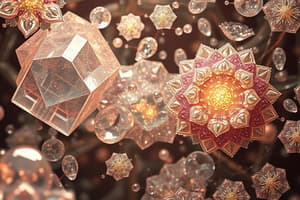Podcast
Questions and Answers
What is the main focus of stoichiometry in chemistry?
What is the main focus of stoichiometry in chemistry?
- Identifying functional groups in carbon compounds
- Balancing equations between reactants and products (correct)
- Exploring energy changes within systems
- Studying solid state solutions
Which area of study in HSC Chemistry involves identifying complex molecule structures using spectroscopy techniques?
Which area of study in HSC Chemistry involves identifying complex molecule structures using spectroscopy techniques?
- Stoichiometry
- Thermodynamics
- Organic Chemistry (correct)
- Solid State Solutions
What type of reactions are commonly studied in organic chemistry?
What type of reactions are commonly studied in organic chemistry?
- Heat transfer and internal energy transformations
- Solid state reactions and synthesis reactions
- Balancing equations and calculating product yields
- Redox reactions and electrophilic addition reactions (correct)
What concept in thermodynamics involves the amount of heat transfer in a system?
What concept in thermodynamics involves the amount of heat transfer in a system?
In the context of chemistry, what does 'solid state solutions' primarily refer to?
In the context of chemistry, what does 'solid state solutions' primarily refer to?
Which area of study is concerned with determining the amount of each substance required for a reaction to proceed completely?
Which area of study is concerned with determining the amount of each substance required for a reaction to proceed completely?
How does understanding thermodynamic principles benefit chemists?
How does understanding thermodynamic principles benefit chemists?
What is the primary focus of stochiometry in chemistry?
What is the primary focus of stochiometry in chemistry?
Which aspect of chemistry focuses on the energetics involved in chemical processes?
Which aspect of chemistry focuses on the energetics involved in chemical processes?
In solid state solutions, how do atoms combine to form solid shapes?
In solid state solutions, how do atoms combine to form solid shapes?
What type of crystal structure do NaCl crystals have?
What type of crystal structure do NaCl crystals have?
Which chemistry course introduces students to the structural features of matter?
Which chemistry course introduces students to the structural features of matter?
Flashcards are hidden until you start studying
Study Notes
HSC Chemistry Overview
The Higher School Certificate (HSC) Chemistry course is designed to equip students with a strong foundation in chemical knowledge and skills. It covers four main areas of study: Organic Chemistry, Stoichiometry, Thermodynamics, and Solid State Solutions. Each area builds upon fundamental concepts from earlier studies, providing a comprehensive understanding of chemistry principles.
Organic Chemistry
Organic chemistry deals with carbon compounds, such as hydrocarbons and functional groups. Students learn how these compounds interact, react, and form various products through different reactions like synthesis, redox reactions, electrophilic addition reactions, and elimination reactions. They also explore spectroscopy techniques used to identify structures of complex molecules based on their properties.
Stoichiometry
Stoichiometry focuses on balancing equations between reactants and products using coefficients. This helps determine the amount of each substance required for a reaction to occur completely, ensuring there are no waste materials produced during the process. Balanced equations serve as a basis for calculating limiting reactant amounts needed for specific desired product yields.
Thermodynamics
Thermodynamics explores energy changes within systems involving heat transfer, work done by or against forces, and internal energy transformations. These energy transfers can affect whether a physical change will proceed spontaneously or under special conditions requiring external inputs. Understanding thermodynamic principles allows chemists to predict if a system's temperature, pressure, volume, etc., will vary after certain actions take place.
Solid State Solutions
This section addresses solids formed when atoms combine into perfect lattices. There are three types of crystal structures - ionic covalent, metallic covalent, and interstitial solid - all characterized by unique arrangements of particles forming solid shapes. For example, NaCl crystals have a face-centered cubic lattice structure while MOx oxide minerals have a body centered tetragonal lattice arrangement.
In summary, the HSC Chemistry curriculum provides students with essential knowledge that forms the building blocks of advanced chemistry courses. By studying organic chemistry, they understand molecular interactions; stochiometry teaches them practical aspects of controlling reactions; thermodynamics gives insights into energetics involved in chemical processes; lastly, solid state solutions introduce structural features of matter.
Studying That Suits You
Use AI to generate personalized quizzes and flashcards to suit your learning preferences.




